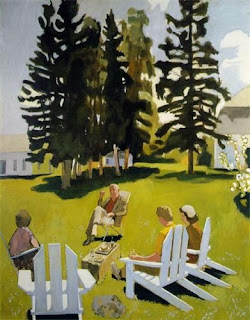The Connection Between Jane Freilicher and Fairfield Porter
A few posts ago I announced that I have been awarded a
residency on Great Spruce Head Island, once the vacation home of Fairfield
Porter who hosted numerous characters from the New York School of painters and poets,
namely James Schuyler who had a room reserved at both the Maine and Southampton
home of the Porters.
Fairfield Porter was an artist that only seemed to grow in
importance after his death—like so many artists and writers. While alive the
kind of art he pursued had no purchase, no level footing amongst Abstract
Expressionism. Jackson Pollack was an acquaintance and neighbor of Fairfield
Porter on Long Island (as was Willem de Kooning)—yet the two were worlds apart.
Firstly, he was viewed as a hobbyist. This was mostly due to
the fact that he owned an island. He came from a wealthy family and in truth
didn’t have to work or earn money.
Yet he lived relatively modestly. Among the Bohemian crowd he circulated with,
he was a bit of a dad, okay, a bisexual experimenting dad, but that’s not so
unusual really. He loved widely, lived expansively. And never seemed to give up
on his friends. His artwork is described as representational, his subject
matter that of everyday life. The kids sitting in the living room reading, a
boy and girl under a tree, a vase of flowers on a table, the Spruce Head house,
the island in sunlight, a girl on a bike, friends.
 |
| James Schuyler with Fairfield Porter's daughter Katherine |
Keep in mind representational encompasses impressionism.
There is still great mystery to these pictures, a feeling that there is more
than meets the eye. The images are not quite in focus, separate, alone.
 |
| on the island |
Jane Freilicher also took the more conservative route. So
many of her friends were into abstract—why didn’t she just go along or fall
under their influence? What caused her to keep to her own path? One that didn’t
get as much attention, reviews, shows.
From her New York Times obituary: Ms.
Freilicher had her first solo show at the Tibor de Nagy Gallery in 1952. In a
review for ARTnews, the painter and critic Fairfield Porter called her work
“traditional and radical.” Her paintings, he wrote, “are broad and bright,
considered without being fussy, thoughtful but never pedantic.”
Ms. Freilicher also counted among her circle of admirers
the New York poets Frank O’Hara, James Schuyler, Kenneth Koch and, above all,
John Ashbery, who wrote frequently about her work and was the first to buy one
of her paintings.
The dominant style at the time was Abstract
Expressionism.
“Realism is the only way I can do
it,” she told Mr. Porter, who became a good friend as well as a critical
champion, in a 1956 ARTnews article. “Every so often I get an anxious feeling
and would like to produce that bombed-out effect of modern painting. Maybe my
form is too closed. I feel a certain desire for exploding a picture the way
some artists do. Can you explode a painting realistically? I don’t know.” She
passed away December 9, 2014.
 |
| Early Fall, 2013 |
Jane’s subject
matter mirrors Fairfield Porters, the extraordinary ordinary.
Fairfield Porter Archive, The Parrish Art Museum, Southampton, New York
Right now I am
applying for an arts grant from the city of Chicago. These are highly
sought-after and fiercely competitive. In retrospect much of my work seems
pedestrian, lightly topical. Vignettes, flashes of everyday life. Remembrances.
I just hope that I don’t have to wait to die before my work gets appreciated.


Comments